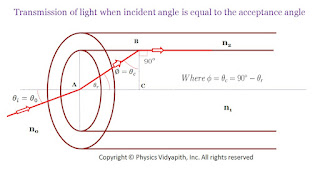Derivation of interference of light due to a wedge-shaped thin film:
 |
| Interference of light due to wedge-shaped thin film |
The wedge-shaped film is bound by two plane surfaces inclined at angle $\alpha$.
The thickness t of the film varies uniformly from zero at the edge to its maximum value at the other end.
A Ray of light ab incident on the film will be partially reflected along be and partially transmitted along $BC$. The ray $BC$ will be partially reflected along $CD$ which will be again partially transmitted along $BF$. The two rays $BE$ and $DF$ in reflected light diverge.
The path difference between ray $BE$ and $DF$ is
$\Delta=\mu(BC+CD)-BG \qquad(1)$
Where $\mu$- Refractive index of the film
$\Delta CDJ$ and $\Delta CHJ$ are congruent so
$
\begin{Bmatrix}
CD=CH \\
DJ=JH=t
\end{Bmatrix}
\qquad(2)$
From equation $(1)$
$\Delta=\mu(BK+KC+CH)-BG \qquad (\because BD=BK+KC)$
$\Delta=\mu(BK+KH)-BG \qquad (3)$
In $\Delta BDG$-
$sin\:i = \frac{BG}{BD}$
$BG=BD sin \: i \qquad(4)$
In $\Delta BDK$
sin\:r =\frac{BK}{BD}
$BD=\frac{BK}{sin \: r} \qquad(5)$
From equation $(4)$ and equation $(5)$-
$BG=BK. \frac{sin \: i}{sin \: r}$
$BG=\mu . BK \qquad(6) \qquad (\because \mu=\frac{sin \: i}{sin \: r})$
Now put the value of $BG$ in equation $(3)$
$\Delta= \mu(BK+KH)- \mu. BK$
$\Delta= \mu.KH \qquad(7)$
In $\Delta DKH$
$cos \: (\alpha + r)= \frac{KH}{DH}$
$KH=DH \: cos \: (\alpha + r)$
$KH=(DJ+JH) \: cos \: (\alpha + r)$
$KH=2t \: cos \: (\alpha + r) \qquad(8) $ {From equation $(2)$}
Now put the value of $KH$ in equation $(7)$
$\Delta= 2\mu t \: cos \: (\alpha + r)$
The ray $DF$ suffers a phase change of $\pi$ due to reflection from a denser medium at $C$. Whereas there is not any change in phase due to reflection for ray $BE$.
$\Delta= 2\mu t \: cos \: (\alpha + r) \pm \frac{\lambda}{2}$
For Constructive Interference:
$\Delta= n \lambda$
$\Delta= 2\mu t \: cos \: (\alpha + r) \pm \frac{\lambda}{2}= n \lambda$
$ 2\mu t \: cos \: (\alpha + r)= (2n \pm 1) \frac{\lambda}{2}$
For Destructive Interference:
$\Delta= (2n \pm 1) \frac{\lambda}{2}$
$\Delta= 2\mu t \: cos \: (\alpha + r) \pm \frac{\lambda}{2}=(2n \pm 1) \frac{\lambda}{2}$
$\Delta= 2\mu t \: cos \: (\alpha + r) =2n \lambda$


